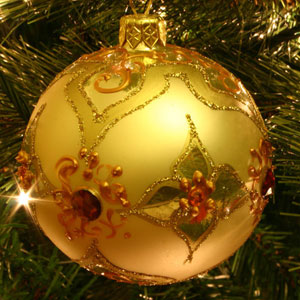The language of Christmas
‘It’s Chriiiiiiistmaaaaaaaaaaaaaas!’
Holder’s tribal ululation induces a primal, atavistic chill. The long night has begun.
Of course, some people love Christmas. But it doesn’t really matter either way, since participation is compulsory. For those who want an intellectual breather from the rampant consumerism and inane merriment, here are a few Christmas words and where they come from.
(I don’t really know all this of course, it’s shamelessly ‘researched’ off Wikipedia. But it’s Christmaaaas, so give me a break.)
Advent, from the Latin adventus meaning ‘coming’, is the time when Christians prepare to celebrate the birth of Christ. Advent calendars have their origins in the German Lutherans, who would mark each day leading up to Christmas by drawing a chalk line on the door, hanging a picture or lighting a candle.
A bauble was originally a mock symbol of office carried by a court jester. It then came to mean anything frivolous or worthless, and was eventually applied to the spherical, shiny Christmas ornaments that were first produced in 1847. As a child, I once tried to eat one, believing all decorations were chocolate – they stayed on high branches for a few years after that.
Christmas carols are pretty much the only type of carols now, but there used to be others too. Originally they were religious songs, often for dancing; in the UK, such Catholic frippery was frowned on after the Reformation. ‘Carol’ comes from the French carole, meaning circle dance. (As a given name, ‘Carol’ is a female equivalent for ‘Carl’ or ‘Charles’ – nothing to do with music or dance.)
Mince pies were originally pies made with minced meat, with fruit and spices added to the meat as a preservative. The meat gradually disappeared over time, leaving us with today’s meatless descendants. In Scotland, however, a mince pie is still a pie made with meat – so the seasonal fruit version is, sensibly, called a ‘Christmas pie’.
Noël, or Nowell in English, is simply the French word for ‘Christmas’, and means exactly the same as a first name – hence its popularity for babies born on or near Christmas Day. It’s originally derived from natalis – Latin for ‘birth’ or ‘nativity’.
Santa Claus’ name comes from the Dutch Sinterklaas, or Saint Nicholas. Being a saint, he was depicted wearing bishop’s robes until the nineteenth century, when US artists rebranded him in red ‘n’ white. (It’s possible that he has pre-Christian roots too, since there are parallels with the Norse god Odin.) Santa is actually a different person from Father Christmas, who traditionally typified good cheer but did not bring any gifts – but the two have merged over time. I’ve explained to my daughter that her ‘Santa Christmas’ is a meaningless portmanteau term, but she’s having none of it.
The first mentions of stuffing were in a Roman cookbook, which included a recipe for stuffed dormouse. The seasonal ‘ten-bird roast’ involves stuffing a large turkey with a goose, duck, mallard, guinea fowl, chicken, pheasant, partridge, pigeon and woodcock, along with some sausage and bacon for good measure. It can feed around 30 people – provided none of them have qualms about subjecting our fellow tenants on earth to such an appalling posthumous indignity.
Tinsel was invented in 1610 and was originally made from shredded silver, which presumably made it the preserve of the very rich. Paper coated with aluminium was soon used instead, but proved highly flammable, and today’s tinsel is made from PVC. The word ‘tinsel’ is from the Old French estincele, meaning ‘sparkle’, and is a rare surname in Germany, the Czech Republic and Denmark. Just imagine – if only I’d been born Danish, I could have been Tom Tinsel.
Turkeys were so named when Europeans first encountered them in America. Mistakenly identifying them as ‘Turkey fowl’ or guineafowl (which really did come from Turkey and the surrounding region), they soon shortened the name to just ‘turkey’, and it stuck. The correct collective noun is a ‘rafter’, although some people call a group of turkeys a ‘gobble’.
Yule was originally a pagan fertility festival, celebrated by Germanic peoples, that was later absorbed into Christmas. The traditions of hanging mistletoe and burning a yule log seem to come from the same origin. No one really knows where the word comes from.
The ‘X’ in Xmas, an abbreviation for Christmas, is derived from the Greek letter Chi, the first letter of the Greek word for ‘Christ’. The word ‘Xmas’ is snootily deprecated by most leading style guides, and sometimes criticised by those who see it as ‘taking the “Christ” out of Christmas’. Seems to me He checked out some time ago…
A very merry Christmas to all my readers, clients and colleagues.
Tags: advent, bauble, Christmas, Father Christmas, mince pie, noël, Santa Claus, stuffing, tinsel, turkey, xmas
